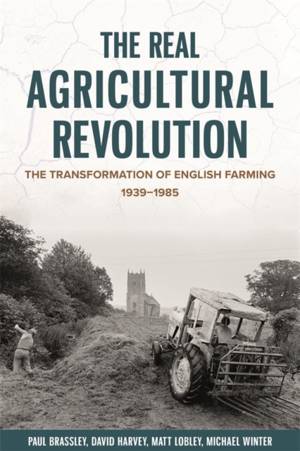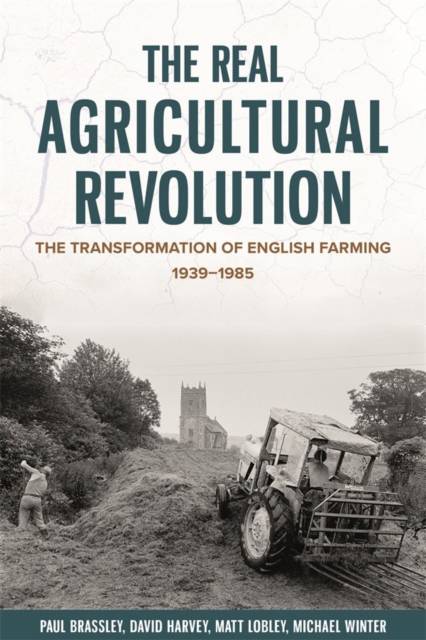
Je cadeautjes zeker op tijd in huis hebben voor de feestdagen? Kom langs in onze winkels en vind het perfecte geschenk!
- Afhalen na 1 uur in een winkel met voorraad
- Gratis thuislevering in België vanaf € 30
- Ruim aanbod met 7 miljoen producten
Je cadeautjes zeker op tijd in huis hebben voor de feestdagen? Kom langs in onze winkels en vind het perfecte geschenk!
- Afhalen na 1 uur in een winkel met voorraad
- Gratis thuislevering in België vanaf € 30
- Ruim aanbod met 7 miljoen producten
Zoeken
The Real Agricultural Revolution
The Transformation of English Farming, 1939-1985
Paul Brassley, Michael Winter, Matt Lobley, David Harvey
€ 209,45
+ 418 punten
Uitvoering
Omschrijving
"This meticulously researched book gives a detailed and authoritative history of agricultural change in the second half of the twentieth century. The book skilfully weaves together the hitherto underexplored individual returns of the Farm Management Survey with oral histories of the farmers who enacted change on the ground to offer an incisive account of the complex technological, political and cultural developments which gave rise to some of the greatest changes in English farming history. It will stand as the key reference point for those with an interest in the history of agricultural change in Britain." Professor Mark Riley, University of Liverpool
At the outbreak of the Second World War in 1939 British agriculture was largely powered by the muscles of men, women, and horses, and used mostly nineteenth-century technology to produce less than half of the country's temperate food. By 1985, less land and far fewer people were involved in farming, the power sources and technologies had been completely transformed, and the output of the country's agriculture had more than doubled. This is the story of the national farm, reflecting the efforts and experiences of 200,000 or so farmers and their families, together with the people they employed. But it is not the story of any individual one of them. We know too little about change at the individual farm level, although what happened varied considerably between farms and between different technologies.
Based on an improbably-surviving archive of Farm Management Survey accounts, supported by oral histories from some of the farmers involved, this book explores the links between the production of new technologies, their transmission through knowledge networks, and their reception on individual farms. It contests the idea that rapid adoption of technology was inevitable, and reveals the unevenness, variability and complexity that lay beneath the smooth surface of the official statistics.
At the outbreak of the Second World War in 1939 British agriculture was largely powered by the muscles of men, women, and horses, and used mostly nineteenth-century technology to produce less than half of the country's temperate food. By 1985, less land and far fewer people were involved in farming, the power sources and technologies had been completely transformed, and the output of the country's agriculture had more than doubled. This is the story of the national farm, reflecting the efforts and experiences of 200,000 or so farmers and their families, together with the people they employed. But it is not the story of any individual one of them. We know too little about change at the individual farm level, although what happened varied considerably between farms and between different technologies.
Based on an improbably-surviving archive of Farm Management Survey accounts, supported by oral histories from some of the farmers involved, this book explores the links between the production of new technologies, their transmission through knowledge networks, and their reception on individual farms. It contests the idea that rapid adoption of technology was inevitable, and reveals the unevenness, variability and complexity that lay beneath the smooth surface of the official statistics.
Specificaties
Betrokkenen
- Auteur(s):
- Uitgeverij:
Inhoud
- Aantal bladzijden:
- 300
- Taal:
- Engels
- Reeks:
- Reeksnummer:
- nr. 1
Eigenschappen
- Productcode (EAN):
- 9781783276356
- Verschijningsdatum:
- 17/09/2021
- Uitvoering:
- Hardcover
- Formaat:
- Genaaid
- Afmetingen:
- 150 mm x 231 mm
- Gewicht:
- 612 g

Alleen bij Standaard Boekhandel
+ 418 punten op je klantenkaart van Standaard Boekhandel
Beoordelingen
We publiceren alleen reviews die voldoen aan de voorwaarden voor reviews. Bekijk onze voorwaarden voor reviews.









